Sheldon Jackson encloses the plan for the Pueblo Industrial Indian Boarding School in Albuquerque, New Mexico to the Office of Indian Affairs. Jackson also states that he is having difficulty recruiting students for the Carlisle Indian School and the Hampton Normal and Agriculture School.
Hampton Normal and Agricultural Institute
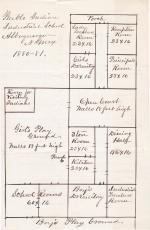
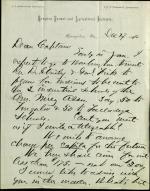
Samuel Chapman Armstrong of the Hampton Institute writes to Richard Henry Pratt requesting his involvement in lobbying for higher per capita funding for Indian students, and discusses recruitment for other schools.
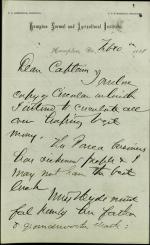
Samuel Chapman Armstrong of the Hampton Institute writes to Richard Henry Pratt enclosing a soon-to-be-distributed circular (missing from the file), and discussing both the Ponca party of visitors and Armstrong's hopes to take a delegation of students to Washington.
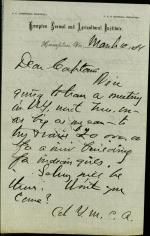
Samuel Chapman Armstrong of the Hampton Institute writes to Richard Henry Pratt inviting him to a fundraising event in New York to raise money for a girl's dormitory building at Hampton.
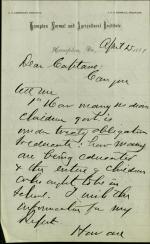
Samuel Chapman Armstrong of the Hampton Institute writes to Richard Henry Pratt requesting information on treaty obligations for the education of Indian children for a report he is writing. Armstrong also discusses upcoming visitors to Hampton as well as the results of a fundraising event for a girl's dormitory at Hampton.
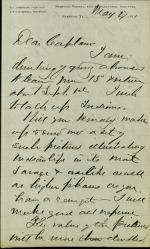
Samuel Chapman Armstrong of the Hampton Institute writes to Richard Henry Pratt informing him of a planned trip abroad to advocate for Native American education. Armstrong asks Pratt to send photographs of various aspects of Native American life for the purposes of his trip.
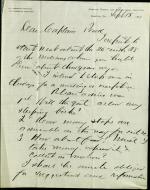
Samuel Chapman Armstrong of the Hampton Institute writes to Richard Henry Pratt asking for expense details for the return home of former Ft. Marion prisoners educated at Hampton over a three-year period. Armstrong also notes that the recovery of President James A. Garfield from an assassination attempt will be a benefit for them as they seek…
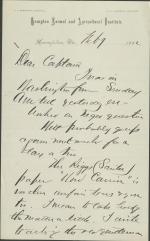
Samuel Chapman Armstrong of the Hampton Institute writes to Richard Henry Pratt discussing a recent trip taken to Washington, as well as an article about both men in the Word Carrier newspaper, published at the Santee Normal Training School. Armstrong suggested that either he or Pratt should write in response to the article.
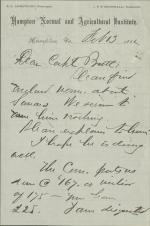
Samuel Chapman Armstrong of the Hampton Institute writes to Richard Henry Pratt about his newest per capita funding rate from the government, which he argues is too low.
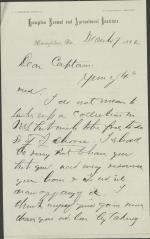
Samuel Chapman Armstrong of the Hampton Institute writes to Richard Henry Pratt discussing Armstrong's planned public talk in New York, as well as criticisms from Alfred Riggs and its impacts.
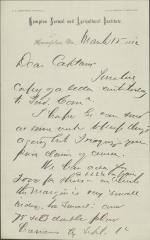
Samuel Chapman Armstrong writes to Richard Henry Pratt concerning an order for horseshoes from Hampton, which Armstrong notes has a very small profit margin.
Note: This is a partial letter, missing all but the first page.
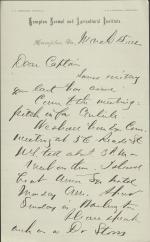
Samuel Chapman Armstrong of the Hampton Institute writes to Richard Henry Pratt again requesting him to attend a public talk in New York about the Indian schools.
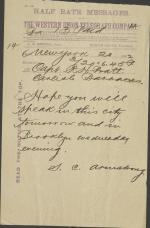
Samuel Chapman Armstrong of the Hampton Institute telegraphs Richard Henry Pratt pleading with him to speak at two events in New York the two following days.
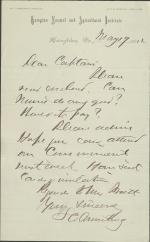
Samuel Chapman Armstrong of the Hampton Institute writes to Richard Henry Pratt, forwarding a letter and asking for advice on how to respond. The forwarded letter is not included in this file. Armstrong also invites Pratt to Hampton's commencement exercises.
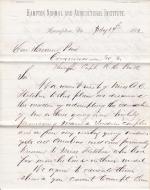
Samuel C. Armstrong writes that the Hampton Normal Institute is willing to educate three married Omaha couples along with three girls and one boy as government students if Alice C. Fletcher is able to bring them with the Sioux delegation going to the Carlisle Indian School. Richard Henry Pratt notes that he would be willing to accept married…
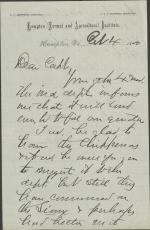
Samuel Chapman Armstrong of the Hampton Institute writes to Richard Henry Pratt discussing enrollment quotas as well as the Chippewa and Sioux.
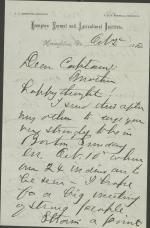
Samuel Chapman Armstrong of the Hampton Institute writes to Richard Henry Pratt, urging him to attend a large meeting in Boston where 24 Hampton students would be present, to convince the public of the value of Indian education.
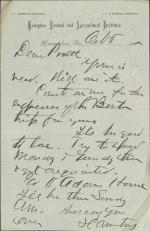
Samuel Chapman Armstrong of the Hampton Institute writes to Richard Henry Pratt discussing logistics of a trip to Boston.
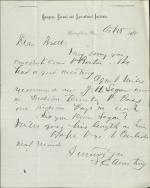
Samuel Chapman Armstrong of the Hampton Institute writes to Richard Henry Pratt regretting that Pratt was unable to come to Boston for a meeting, and asks for information on J. H. Segar, an individual recommended to Armstrong by Agent Miles to oversee male students' work at Hampton.
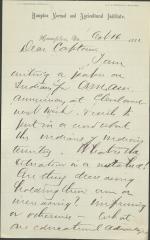
Samuel Chapman Armstrong of the Hampton Institute writes to Richard Henry Pratt asking for information about Indian Territory and its peoples to include in a paper for the American Missionary Association meeting in Cleveland.
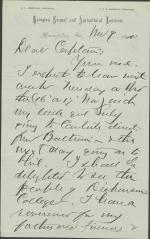
Samuel Chapman Armstrong of the Hampton Institute writes to Richard Henry Pratt with trip logistics for Armstrong's visit to Carlisle, including an expressed desire to meet with supporters at Dickinson College.
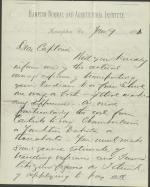
Samuel Chapman Armstrong of the Hampton Institute writes to Richard Henry Pratt to get an estimate of student travel expenses from Carlisle to the West. Armstrong also complains of financial limitations recently placed by Congress, and offers support for any of Pratt's efforts to advocate with the Indian Department.
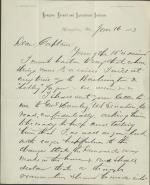
Samuel Chapman Armstrong of the Hampton Institute writes to Richard Henry Pratt discussing his willingness to lobby for both Hampton and Carlisle.
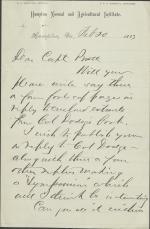
Samuel Chapman Armstrong of the Hampton Institute writes to Richard Henry Pratt asking for him to write feedback on excerpts from Col. Richard H. Dodge's book Thirty-three Years among Our Wild Indians for publication. Armstrong wishes to challenge some of Dodge's claims.
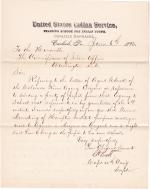
Richard Henry Pratt writes in regards to an inquiry from the U.S. Indian Agent of the Colorado River Agency to sending students to Carlisle. Pratt notes that Samuel C. Armstrong of the Hampton Institute is going to be visiting agencies in Arizona and recommends that the students from the agency instead be sent to Hampton via Armstrong's return…
